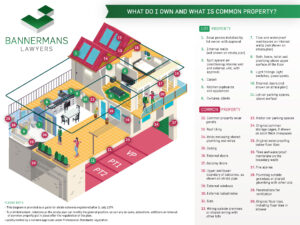In Strata, renovations are classified into three distinct types as outlined in the Strata Schemes Management Act 2015:
1. COSMETIC RENOVATIONS
Cosmetic Renovations are superficial alterations that don’t affect the structure or exterior of your property and don’t require waterproofing. These types of renovations DON’T require strata approval.
Examples include:
- Installing or replacing hooks, nails, screws, handrails, blinds, curtains, or built-in wardrobes.
- Interior painting.
- Filling minor holes and cracks in internal walls.
- Laying or replacing carpet.
2. MINOR RENOVATIONS
Minor renovations include things like changes to internal walls or changes to recessed light fittings. While relatively minor, these types of renovations DO require strata approval as they may affect other owners and residents, directly or indirectly.
Examples include:
- Kitchen renovations.
- Reconfiguring internal walls (excluding work involving structural changes).
- Changing recessed light fittings.
- Installing or replacing wiring, cabling, power, or access points.
- Installing or replacing wood or other hard floors.
- Removing carpet from floors.
3. MAJOR RENOVATIONS
Major renovations involve significant changes that impact the structure and framework of both your property and common areas. These types of renovations DO require strata approval through a special resolution vote.
Examples include:
- Structural changes.
- Waterproofing.
- Alterations affecting the property’s external appearance, such as roof or balcony works.
- Work requiring approval under other laws (e.g. council approval).



